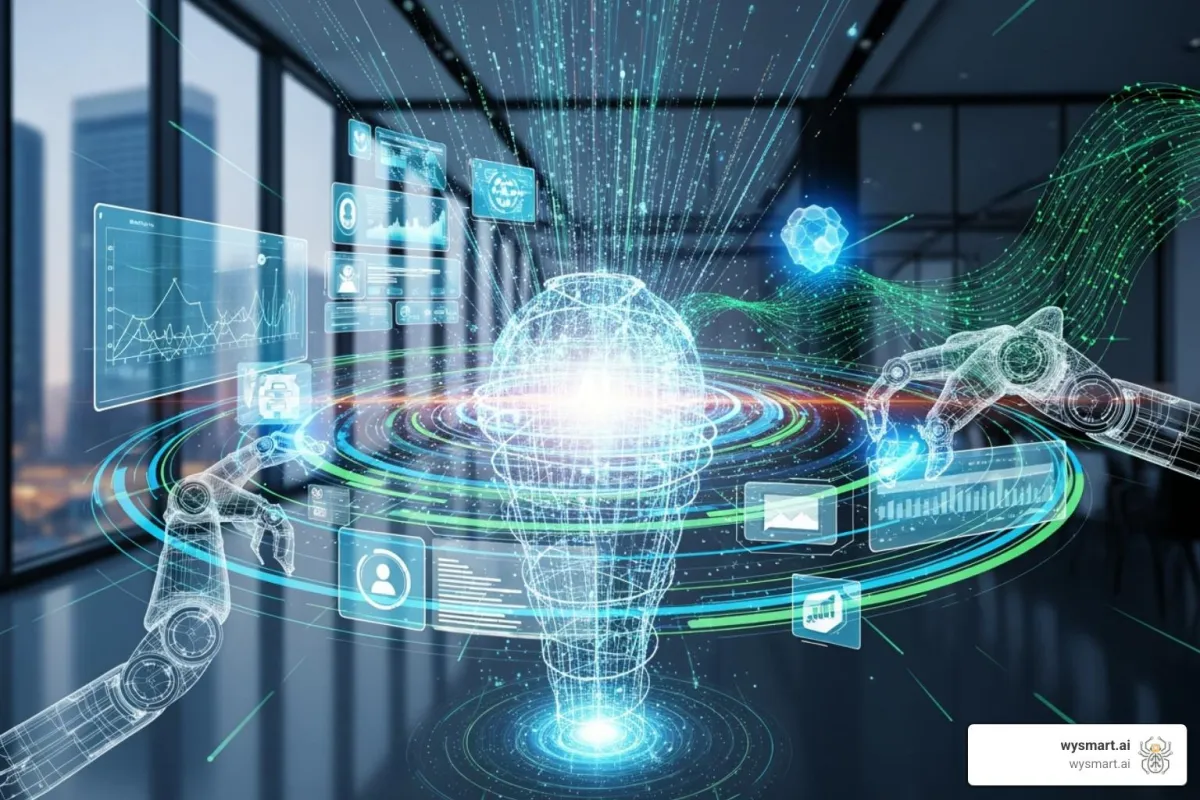
Intelligent Automation: Your Enterprise's Next Big Leap
Why Enterprise Intelligence Automation Is Changing Business Operations
Enterprise intelligence automation is rapidly becoming the cornerstone of modern business success. This powerful combination of artificial intelligence, machine learning, and automation technologies enables organizations to streamline workflows, make smarter decisions, and scale operations without proportionally increasing costs or complexity.
Here's what enterprise intelligence automation delivers for businesses:
Automated Decision-Making: AI processes vast amounts of data to make real-time business decisions
End-to-End Process Optimization: Complete workflows run automatically from start to finish
Intelligent Data Processing: Systems handle unstructured data like documents, emails, and images
Predictive Capabilities: Machine learning anticipates problems and opportunities before they occur
24/7 Operations: Automated systems work continuously without human intervention
The numbers tell a compelling story. Research shows that 89% of automation users report increased job satisfaction, while organizations implementing intelligent automation see dramatic results - from HSBC's 2-4x increase in financial crime detection to Petrobras saving $120M in just three weeks.
Unlike traditional automation that follows rigid rules, intelligent automation adapts and learns. It can handle exceptions, understand context, and continuously improve performance. This evolution from basic task automation to intelligent orchestration represents a fundamental shift in how businesses operate.
I'm Joey Martin, founder of WySMart.ai, where I've spent years helping small businesses harness the power of enterprise intelligence automation to compete with larger companies. My experience working directly with business owners has shown me how these technologies can level the playing field when implemented correctly.
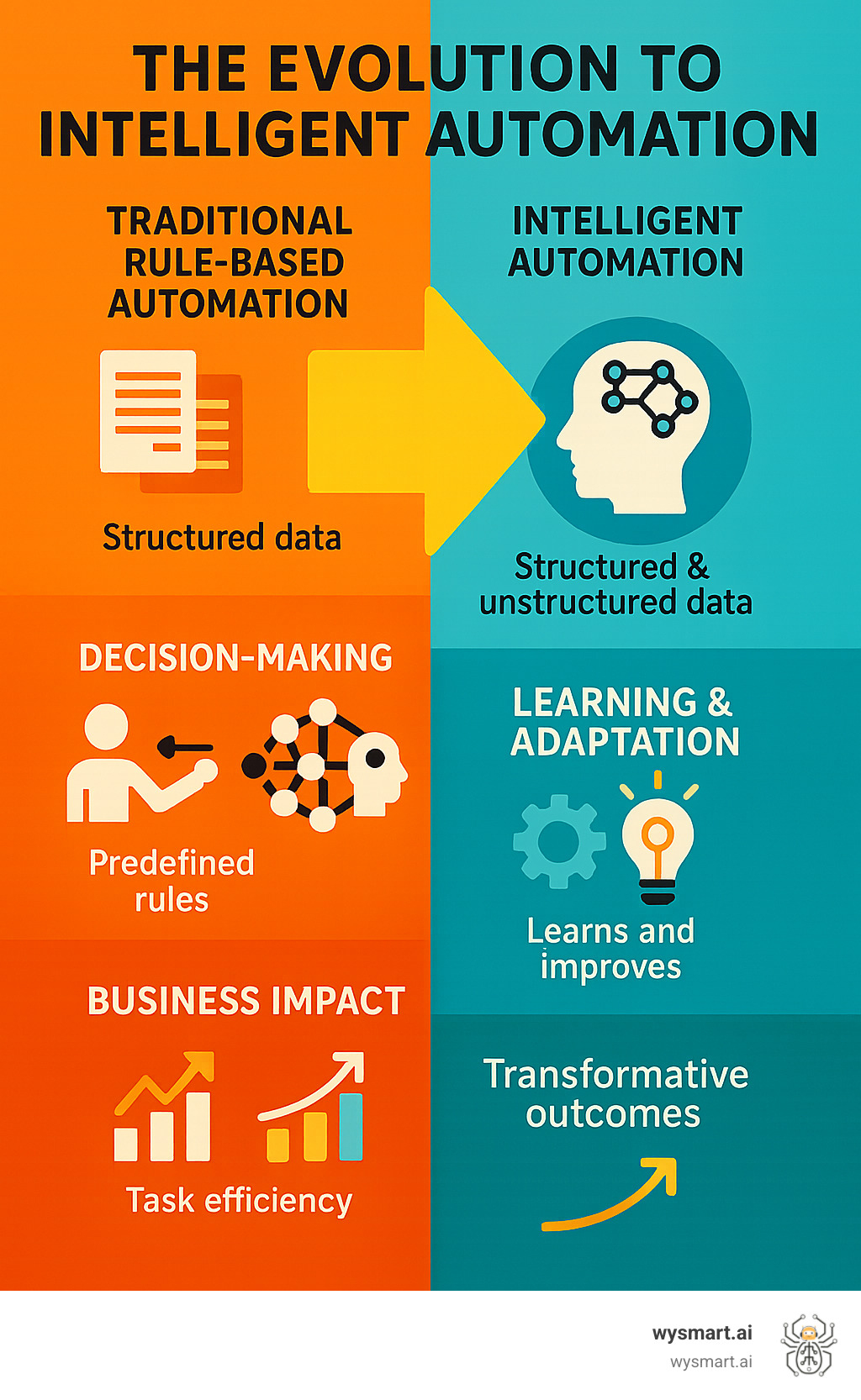
What Is Intelligent Automation and How Does It Evolve Business Processes?
Imagine business processes that don't just follow rules, but think, learn, and adapt. That's the power of enterprise intelligence automation, which moves beyond simple task repetition to handle complex decisions and unexpected situations.
Intelligent automation (IA), or cognitive automation, is a fundamental shift in business process management. Instead of just automating individual tasks, IA streamlines entire workflows that can handle the unpredictable nature of real-world operations. It's like upgrading from a basic calculator to a smartphonesuddenly, new possibilities become routine.
At its core, intelligent automation combines traditional automation with AI capabilities like machine learning and natural language processing. This allows businesses to tackle tasks that once seemed too complex for machines. While traditional automation excels at rigid, rule-based work, intelligent automation shines when exceptions arise. It augments human intelligence by understanding context, handling unstructured data like emails and documents, and learning from experience. For background on related foundations, see Robotic process automation and Business process management.
This evolution allows for the optimization of entire end-to-end processes. We're moving beyond simple tasks into a new territory where systems make nuanced decisions and continuously improve.
Feature Traditional Automation (RPA) Intelligent Automation (IA) Capabilities Automates repetitive, rule-based tasks Handles complex, cognitive tasks requiring judgment and adaptability Data Handling Processes structured data (spreadsheets, forms) Manages both structured and unstructured data (emails, documents, images) Decision-Making Follows predefined rules only Makes data-driven decisions and adapts to new situations
From Repetitive Tasks to Dynamic Decisions
Traditional automation is like a fast, accurate robot that follows instructions perfectly. These systems are great for data entry, copying information, and generating reports. They're incredibly efficient but stop when something unexpected happens.
The limitations of basic bots become clear with real-world complexity. A format change, an unusual email, or a missing data field can halt the entire process, requiring human intervention.
Intelligent automation systems change the game. By integrating AI, they can understand context, extract meaning from unstructured information, and make informed decisions. Imagine a system that understands a customer's email and initiates the correct response automatically.
The beauty of modern intelligent automation is its human-in-the-loop approach. Instead of replacing human judgment, these systems act as capable assistants. They handle the heavy lifting and flag complex situations for human review, enabling true end-to-end process optimization where efficiency meets wisdom.
Key Differentiators for the Modern Enterprise
What makes enterprise intelligence automation so transformative? It's about capabilities that were once science fiction.
Contextual awareness allows systems to understand not just data, but its meaning. An IA-powered customer service system can grasp the frustration in a customer's message and respond appropriately.
Continuous learning, thanks to machine learning, means these systems get smarter with every interaction. They spot patterns and suggest improvements without constant reprogramming.
Handling exceptions gracefully transforms process reliability. Instead of breaking down, intelligent systems can work through unusual scenarios or provide context for human review.
Scaling complex processes becomes achievable. Multi-step workflows spanning different departments can be automated, dramatically improving operational efficiencies without the usual growing pains.
The Engine Room: Core Technologies Driving Intelligent Automation
Think of enterprise intelligence automation as a system where multiple technologies work in harmony to produce incredible results.

At the foundation, several key technologies come together:
Business Process Management (BPM): The blueprint that designs, executes, and optimizes business workflows.
Robotic Process Automation (RPA): The reliable workhorse that handles repetitive, rule-based tasks.
Artificial Intelligence (AI): The brain of the operation, enabling systems to think, reason, and make decisions.
Machine Learning (ML): The learning mechanism that helps systems improve their accuracy and efficiency over time.
Natural Language Processing (NLP): The component that allows systems to understand human language in emails, chats, and documents.
Computer Vision: The technology that lets systems "see" and interpret images and videos for tasks like quality control.
Integration Platform as a Service (iPaaS): The nervous system that connects different software applications so data flows smoothly.
The Internet of Things (IoT): The network of sensors that brings real-world data into your intelligent systems.
The Role of AI and Data in Enterprise Intelligence Automation
Enterprise intelligence automation is only as smart as the data you feed it and the AI that processes it.
Artificial Intelligence is what lifts basic automation to something truly intelligent. Instead of just following rules, AI-powered systems can analyze situations and make informed decisions, like a brilliant analyst.
Machine Learning models are the engines behind this intelligence. They study vast amounts of business data to find patterns humans might miss, forming the basis for predictive modeling and automated decision-making.
Data analytics is equally crucial, turning raw information into actionable insights. This is the power of data-driven decision-making in action, helping you forecast everything from customer churn to equipment maintenance needs.
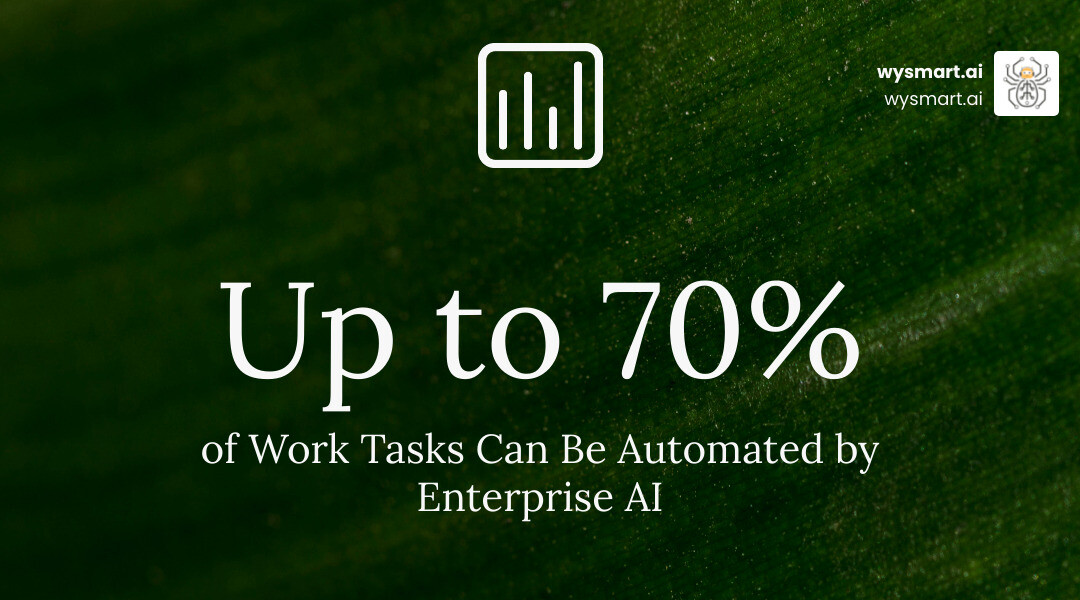
Research suggests that enterprise AI can automate up to 70% of tasks that currently consume employee time. This isn't about replacing people; it's about freeing them for the creative, strategic work that grows your business.
Combining Technologies for a Synergistic Effect
The real power of enterprise intelligence automation is open uped when these technologies collaborate to create AI-powered automation.
Imagine cognitive bots that don't just follow scripts but understand context and adapt to new situations. These intelligent assistants can handle complex customer inquiries, process documents, and even make judgment calls.
Smart workflows take this further. In manufacturing, IoT sensors can monitor equipment while ML algorithms predict breakdowns (predictive maintenance). The system can then automatically order parts, schedule a technician, and adjust production schedules—all without human intervention.
In finance, process mining and AI can analyze thousands of transactions in real-time to spot fraud patterns that are impossible for humans to catch. These systems learn and adapt to new threats continuously.
This synergistic approach makes your business more than just automated—it becomes truly intelligent. Systems that can think, learn, and adapt are what separate thriving companies from those that merely survive.
The Strategic Impact of Enterprise Intelligence Automation
When businesses adopt enterprise intelligence automation, they aren't just upgrading software—they're changing their entire approach to growth and competition. This shift creates a positive ripple effect across the entire organization.

The change begins with increased productivity. When your team is freed from repetitive tasks, they can focus on high-value work like market strategy and customer relationships. This leads to improved operational efficiency, as workflows become smoother, faster, and less prone to error.
Customers notice these changes through an improved customer experience. Faster, more consistent, and more personalized service builds loyalty and turns customers into advocates. Enterprise intelligence automation becomes a powerful competitive advantage, allowing you to operate with the speed and agility of a much larger organization. This technology is a digital change catalyst, preparing your business for whatever the future holds.
Boosting Efficiency and Slashing Operational Costs
The real-world results of enterprise intelligence automation are why businesses are racing to adopt these solutions. Workflow optimization and better resource utilization deliver immediate, measurable returns. For example, some customer support teams have reduced overhead by 30% while increasing customer satisfaction by 10%—a true win-win.
The time savings can be staggering. Kent Community Health NHS Foundation Trust saved over £700K by freeing up 45,000 hours of capacity. Vale saved 121,000 hours and $5 million annually, while Merck saved 150,000 hours on compliance documents. Petrobras achieved $120 million in savings in just three weeks using generative AI.
Error reduction is a natural byproduct of automation. Northampton General Hospital achieved 100% data input accuracy for its oxygen supply monitoring. Electrobras automated 92% of a complex document processing task in four weeks, saving $227,000.
Compliance adherence also improves dramatically. HSBC used AI to increase financial crime detection by 2-4 times while reducing false positives by over 60%. These aren't just efficiency gains; they are transformative changes that free up capital for growth and innovation.
Enhancing Customer Satisfaction and Employee Morale
Here's where enterprise intelligence automation reveals its human side. The technology's impact on people—both customers and employees—is remarkably positive.
Customers receive personalized interactions and faster response times through 24/7 service from intelligent chatbots and automated systems. The improved service quality comes from consistency, as automated processes deliver the same high-quality experience every time.
Surprisingly, employees love it too. Reduced manual work frees your team from the monotonous tasks that drain energy. Instead of copying data, they're solving interesting problems.
A Salesforce survey found that 89% of automation users reported higher job satisfaction, with 84% expressing greater satisfaction with their company. When Softbank automated 85% of its recruitment evaluation, its HR team could focus on strategic talent development instead of paperwork.
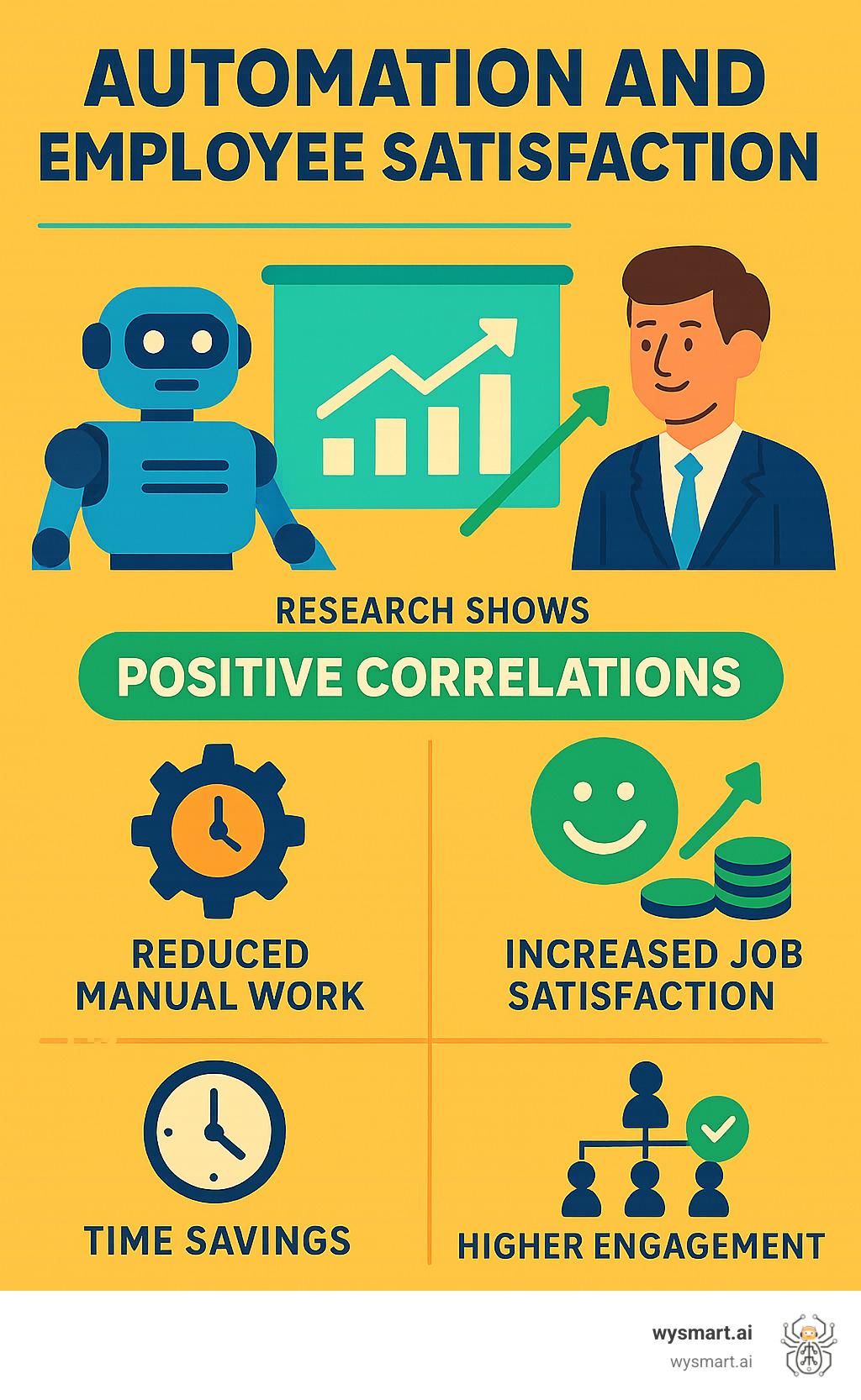
This creates a virtuous cycle: happy employees provide better service, leading to happier customers and a better work environment. Technology doesn't replace the human touch; it amplifies it by removing barriers to great work.
Your Roadmap to Successful Implementation
Enterprise intelligence automation can revolutionize your business, but success requires a plan. Think of it like a road trip: you need a map to reach your destination.

Strategic Planning: Start by identifying your biggest pain points. What processes are slow, error-prone, or frustrating for your team? Clarity here will guide every decision.
Phased Implementation: Don't try to automate everything at once. Start small with a single, high-impact process. Measure the results, celebrate the win, and then expand.
Scaling Initiatives: As your pilot projects succeed, plan for growth. Ensure your infrastructure and platforms can handle increased volume without a drop in performance.
Measuring ROI: Track everything—time saved, errors reduced, customer satisfaction, and employee morale. These metrics build the case for future automation projects.
Future-Proofing: AI technology evolves quickly. Build flexibility into your systems and foster a culture of continuous improvement.
Overcoming Common Adoption Challenges
Every organization faces problems, but smart ones prepare for them.
Data Quality and Integration: Your automation is only as good as its data. Invest time upfront in cleaning data and connecting your systems. It's essential work.
Lack of AI Expertise: You don't need a team of data scientists. Partner with experts or choose solutions with built-in expertise so you can focus on your business.
Securing Stakeholder Buy-in: Go beyond statistics. Share success stories to show how automation will make work-life better and more productive for everyone.
Managing Organizational Change: Address employee concerns about job security head-on. Provide honest communication, training, and a clear vision for how roles will evolve from tedious tasks to more strategic work.
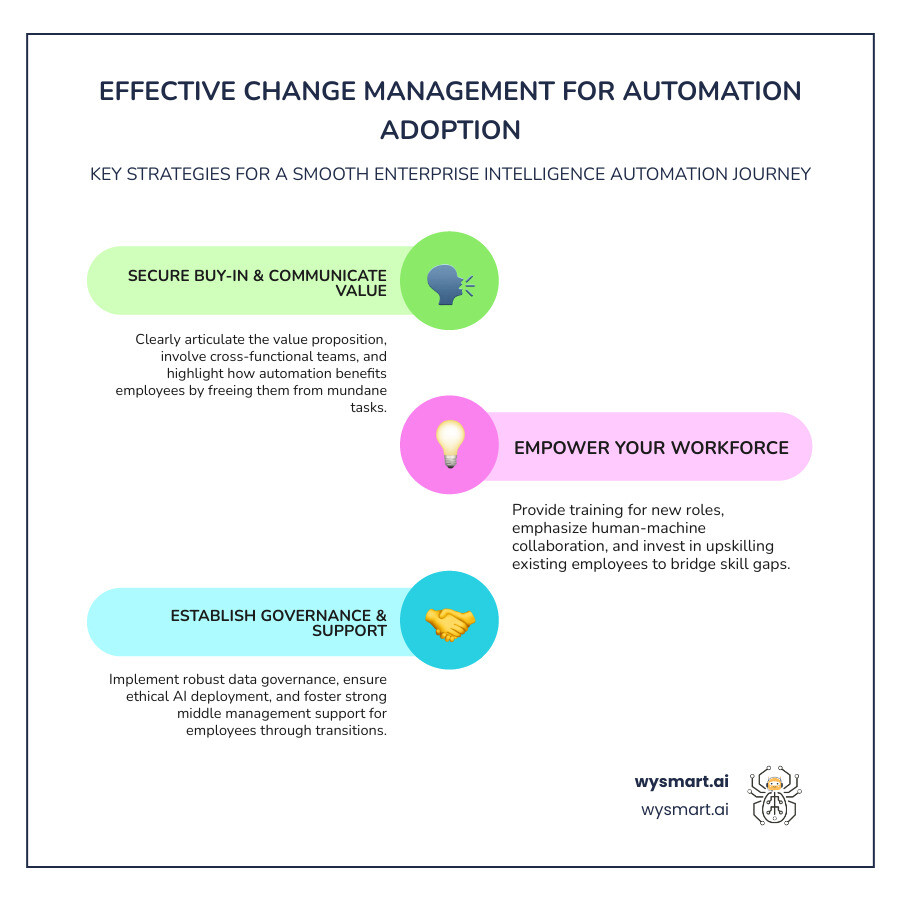
The Future of Work and Enterprise Intelligence Automation
The workplace of tomorrow is being shaped today by enterprise intelligence automation. This is a fundamental shift in how work gets done.
Workforce change means liberation from monotonous tasks. Your team will shift from data entry to data analysis, from routine inquiries to complex problem-solving.
Upskilling and reskilling are your new competitive advantages. The most successful companies are those that invest in teaching their people to work effectively alongside AI systems.
The emergence of AI agents represents the next frontier. These intelligent systems can manage complex, multi-step tasks across different platforms, acting as digital assistants that handle entire workflows.
New job roles like AI trainers and automation specialists are becoming common. The key is to remain curious and adaptable.
Research suggests enterprise intelligence automation could handle up to 70% of current work tasks. This doesn't eliminate jobs; it eliminates the parts of jobs people dislike. The result is a happier, more productive workforce ready to adapt to a changing world. The future belongs to businesses that accept this partnership between human creativity and artificial intelligence.
Frequently Asked Questions about Intelligent Automation
What is the difference between enterprise automation and intelligent automation?
Think of enterprise automation as the overall strategy for automating processes across your entire organization. It's the big-picture plan. Intelligent automation is a powerful type of automation within that strategy. While traditional automation follows rigid, pre-programmed rules, intelligent automation uses AI to handle complex tasks that require learning and decision-making. In short, enterprise automation is the 'what,' and intelligent automation is the 'how'—the smart engine that drives it.
What are some real-world examples of intelligent automation?
Intelligent automation is already delivering powerful results across many industries:
Financial Services: AI-driven systems detect fraud with greater accuracy and fewer false alarms, as seen with institutions like HSBC.
Healthcare: Automation handles administrative workflows, freeing up thousands of hours for patient care and ensuring data accuracy in critical monitoring systems.
Manufacturing & Energy: Predictive maintenance uses IoT data and machine learning to anticipate equipment failure, preventing downtime and saving millions.
Human Resources: AI can screen resumes and evaluate candidates, reducing hiring time by over 80% and allowing HR teams to focus on strategic talent acquisition.
Customer Service: Intelligent chatbots provide 24/7 support, understand customer intent, and resolve issues or escalate them to human agents seamlessly.
How does intelligent automation impact small businesses?
This is where enterprise intelligence automation becomes a true game-changer. It levels the playing field, allowing small businesses to compete with larger corporations. Here's how:
Massive Efficiency Gains: It automates time-consuming tasks like marketing campaigns, lead qualification, invoicing, and data entry, freeing your team to focus on growth.
Scalability Without Overhead: You can handle more business without proportionally increasing staff. The automation works 24/7, allowing you to scale smoothly.
Improved Customer Experience: Offer 24/7 support with AI chatbots and deliver personalized interactions that build loyalty, rivaling the service of big companies.
Data-Driven Decisions: Gain access to insights about your operations and customers automatically, helping you make smarter strategic choices.
With a done-for-you AI toolbox, small businesses can implement sophisticated automation that boosts growth and reduces the stress of managing manual processes.
Conclusion: Your Next Leap into a Smarter Future
We've seen that enterprise intelligence automation is more than a trend—it's a fundamental shift in how modern businesses operate, compete, and thrive. The evolution from simple task automation to intelligent systems that make dynamic decisions is reshaping industries.
The evidence is clear: organizations are achieving dramatic efficiency gains, slashing costs, and improving both customer and employee satisfaction. The true power lies not in replacing humans, but in augmenting human intelligence, freeing people to focus on creative, strategic work.
The imperative to adopt is now. Businesses that accept enterprise intelligence automation will become the leaders of tomorrow, adapting quickly to market changes and delivering exceptional value. For small businesses, this technology levels the playing field, enabling you to scale operations, improve customer experiences, and make data-driven decisions like never before.
The future of work is a partnership between human creativity and machine intelligence. Your next leap into this smarter future is just one decision away.
For small businesses ready to harness these transformative benefits without the complexity, WySmart.ai offers a comprehensive, done-for-you AI toolbox designed to boost growth and reduce stress. We handle the technical details so you can focus on what matters most—your business.